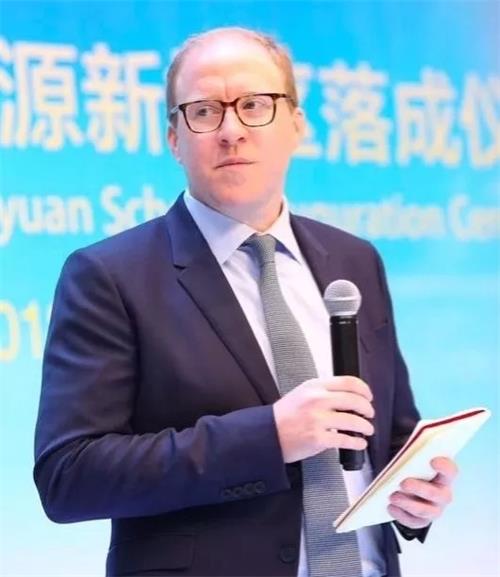中美貿(mào)易戰(zhàn)中的 赴美留學(xué) Sino-US Trade War’s Impact on Studying in the USA
2019年6月20日
為了更好地增強(qiáng)家校溝通,使家長(zhǎng)能夠幫助學(xué)校更好地成長(zhǎng),同時(shí)也為了提高家長(zhǎng)和孩子的溝通能力,增進(jìn)親子關(guān)系,上海宏潤(rùn)博源學(xué)校校方和家校聯(lián)合會(huì)計(jì)劃開(kāi)展家長(zhǎng)沙龍。本學(xué)年于6月6日和6月20日下午試運(yùn)行兩次,下學(xué)年開(kāi)始每月月末一次。
本學(xué)年的兩次沙龍都由我校外方校長(zhǎng) Christopher Moses 主講,第一次的主題是“規(guī)劃指導(dǎo)”(什么是規(guī)劃指導(dǎo),我們是怎么做的);第二次的主題是“中美貿(mào)易戰(zhàn)中的赴美留學(xué)”。Chris校長(zhǎng)對(duì)美國(guó)政治體系及其歷史發(fā)展有深刻認(rèn)識(shí),一起來(lái)看一下專(zhuān)業(yè)的美國(guó)人士如何看待特朗普發(fā)起的貿(mào)易戰(zhàn)以及這種形勢(shì)下的赴美留學(xué)。

Good afternoon, parents.
各位家長(zhǎng)下午好,
Today I’ve been asked to share some thoughts about the current situation involving US-China relations. I’m certainly not an expert, but I hope I can offer some perspectives and context that can help better frame the issue. I know that things may seem uncertain, which is all the more reason to reassure ourselves with clarity about what we do know.
今天我想談?wù)勚忻狸P(guān)系的現(xiàn)狀。雖然我不是這方面的專(zhuān)家,但是我希望我今天提供的觀點(diǎn)和背景信息可以幫助大家更好地理解這個(gè)問(wèn)題。雖然現(xiàn)在局勢(shì)還不明朗,存在一些不確定性,但是我們更應(yīng)該用我們知道的,已經(jīng)確定的東西來(lái)安定我們的心神。
I will divide my comments into two parts:
今天我主要講兩部分內(nèi)容。
the first will offer some context as to the US political environment, and considerations that make lead the current administration to step back from its current approach and become more open to constructive negotiation.
第一部分,我想講一下有關(guān)美國(guó)政治環(huán)境的大背景以及一些會(huì)迫使美國(guó)執(zhí)政當(dāng)局放棄現(xiàn)在的對(duì)抗性策略,采取更加開(kāi)放的有建設(shè)性的談判策略的考量因素。
Second, I want to speak more specifically to issues related to education.
第二部分,我想專(zhuān)門(mén)談一下中美貿(mào)易戰(zhàn)對(duì)赴美留學(xué)的影響。

First, then: I’m far from alone in considering the Trump administration to be anomalous in the recent history of the United States. Regardless of what one thinks of the man as a person, and I will refrain from offering my own views (since my grandmother told me, if you don’t have anything nice to say, you shouldn’t say anything at all) – the actual policies of his administration challenge basic and longstanding approaches of his Republican party (and the larger corporations and wealthier individuals it tends to represent).
首先,很多美國(guó)人都跟我一樣,認(rèn)為特朗普政府的出現(xiàn)是美國(guó)近代歷史上的異常事件。不管大家怎么評(píng)價(jià)特朗普這個(gè)人,我在這兒就不對(duì)他這個(gè)人作出評(píng)價(jià)了(因?yàn)槲易婺父艺f(shuō)過(guò),如果你沒(méi)有什么好聽(tīng)的話(huà)說(shuō),就什么都別說(shuō)了)。特朗普政府現(xiàn)在推行的政策挑戰(zhàn)了他所屬的共和黨以及共和黨所代表的大企業(yè)和大財(cái)團(tuán)一直以來(lái)秉承的基本策略。
Indeed, for generations that party has been guided by an ideology of free trade and limited government intervention in the market.
實(shí)際上,共和黨一直以來(lái)奉行的理念是支持自由貿(mào)易,限制政府干預(yù)市場(chǎng)。
This means that while there is a broad recognition amongst political leaders that the US-China relationship must continue to evolve, there is far from unified support about Trump’s policies or his approach – using tariffs and supposedly security-based justifications to limit certain sectors of trade.
這也意味著許多美國(guó)領(lǐng)導(dǎo)人都認(rèn)為中美關(guān)系應(yīng)當(dāng)持續(xù)發(fā)展,而不是一邊倒地支持特朗普的政策和策略,即利用關(guān)稅或以國(guó)家安全為由限制一些領(lǐng)域的貿(mào)易。
Even more difficult for Trump, the same bravado that he has used with China has also been directed toward some of the closest and longest-standing allies of the US: threats to Japan and the EU about car production, battles with Canada and Mexico over NAFTA, and comments that challenge aspects of Great Britain’s own trade practices (to name just a few). Just last week, Trump’s further threats to use tariffs against Mexico in response to immigration across the US’s southern border led to a broad and open rebuke from Republicans in Congress – who are very sensitive to corporation’s frustrations with Trump’s policies. They forced his hand, causing him quickly to announce a “great deal” and save face.
特朗普的處境比較艱難,他不但在處理中美關(guān)系時(shí)虛張聲勢(shì)和冒進(jìn),在對(duì)待美國(guó)長(zhǎng)期以來(lái)的盟友國(guó)時(shí)亦是如此,比如:在汽車(chē)制造方面威脅日本和歐盟,在北美自由貿(mào)易協(xié)定上與加拿大和墨西哥產(chǎn)生爭(zhēng)執(zhí),發(fā)出挑戰(zhàn)英國(guó)國(guó)家貿(mào)易政策的評(píng)論等。上周,在對(duì)待墨西哥移民從美國(guó)南部邊境進(jìn)入美國(guó)的問(wèn)題上,特朗普用進(jìn)一步提高關(guān)稅威脅墨西哥,這一舉措在國(guó)會(huì)上遭到共和黨人廣泛公開(kāi)的反對(duì)。共和黨及其所代表的企業(yè)和利益集團(tuán)對(duì)特朗普政府讓人失望的政策非常敏感。他們給特朗普施加壓力,導(dǎo)致他匆匆宣布達(dá)成了"不錯(cuò)的交易“,為挽回顏面,草草收?qǐng)觥?/p>
So, there is tension in Trump’s relationship with his own party, and also with international allies – which means that actually trying to manage the trade war he has provoked becomes much harder, as he is acting in isolation and with uncertain support. Further, he is hampered by the fact that he has proposed only a very vague endgame regards his actions, citing the trade deficit and amorphous concerns about “fairness.”
由此也不難看出,特朗普與其所屬的共和黨以及國(guó)際盟友的關(guān)系都很緊張。這也意味著,他想控制自己挑起的貿(mào)易戰(zhàn)會(huì)更加艱難,因?yàn)樗F(xiàn)在是光桿司令,得不到確定的支持。此外,他只是以貿(mào)易逆差,以及對(duì)于“貿(mào)易公平”的含糊的擔(dān)心為由來(lái)支持自己的行為,但并沒(méi)有明確表明他想通過(guò)這些行為來(lái)實(shí)現(xiàn)怎樣的結(jié)果,這本身也會(huì)限制他的行為。
To a larger extent, he is trapped by a certain nostalgia for a great age of manufacturing which will never return and, as sensible commentators point out, ended not because of trade with China, but as a result of technological change and automation. Trump’s view of economics and trade as a zero-sum game appeals to certain elements of the US populous, but the mounting costs of the trade war, and further and more severe consequences, may undermine even that base of support.
很大程度上,特朗普陷入了一種對(duì)美國(guó)過(guò)去制造業(yè)蓬勃發(fā)展的美好時(shí)代的懷戀,但這個(gè)時(shí)代不會(huì)逆歷史趨勢(shì)重現(xiàn)。正如一些明智的社評(píng)人員所說(shuō)的那樣,這個(gè)時(shí)代的終結(jié)不是因?yàn)榕c中國(guó)的貿(mào)易,而是因?yàn)榭萍嫉陌l(fā)展和自動(dòng)化。特朗普認(rèn)為經(jīng)濟(jì)和貿(mào)易是一場(chǎng)“零和”游戲的觀點(diǎn)對(duì)于部分美國(guó)人確實(shí)有吸引力,但是貿(mào)易戰(zhàn)帶來(lái)成本攀升,以及接下來(lái)更嚴(yán)重的后果,可能會(huì)從根本上削弱這部分人對(duì)特朗普的支持。
Trump has enjoyed a sort of economic honeymoon in the first years of his presidency, though many longer-term indicators (well beyond the trade war) suggest that the US economy will face greater challenges in the near future. The massive tax cuts passed early in his administration served as a sort of stimulus for increased corporate profits and buoyed the stock market, but other persistent concerns – wage stagnation, healthcare costs, affordable housing, student loan debt, and the like, still remain.
特郎普剛上臺(tái)的兩三年里,美國(guó)經(jīng)濟(jì)確實(shí)有所改善,但是許多長(zhǎng)期指標(biāo)(超越暫時(shí)的貿(mào)易戰(zhàn))表明美國(guó)經(jīng)濟(jì)將會(huì)在不久的將來(lái)面臨更大的挑戰(zhàn)。特朗普上臺(tái)之初大幅削減稅收,確實(shí)刺激了美國(guó)企業(yè)利益的增長(zhǎng),使股市上浮,但是長(zhǎng)期以來(lái)存在的問(wèn)題如工資停滯、醫(yī)療成本、經(jīng)濟(jì)適用房、學(xué)生貸款債務(wù)等問(wèn)題依然存在。
This fall, Congress will also need to pass a budget and increase the debt ceiling so that the US can continue to operate—yet there is little suggestion that an agreement will be reached easily. This could lead to another government shutdown and unsettle both bond and equities markets, with serious consequences throughout the economy.
今年秋季,美國(guó)國(guó)會(huì)需要再通過(guò)一個(gè)預(yù)算提案,提升債務(wù)的上限,以美國(guó)政府可以正常運(yùn)行。不過(guò),目前來(lái)看,這個(gè)提案沒(méi)那么容易通過(guò)。這也可能導(dǎo)致美國(guó)政府再次關(guān)門(mén),使證劵和股權(quán)市場(chǎng)再次動(dòng)蕩,嚴(yán)重影響美國(guó)經(jīng)濟(jì)。
Also, this fall will also present two further challenges for Trump’s economic policies.
今年秋季,特朗普政府的經(jīng)濟(jì)政策還將面臨兩大挑戰(zhàn)。
First, the agricultural sector will be reckoning with losses (and trying to recoup subsidies from the government) because of its inability to sell to China. While not a major part of the overall US economy, farmers – and the midwestern states in which they live – have a hugely outsized political influence (as a result of the fact that seats in the powerful Senate, or upper house of Congress, are allocated by state and not by population).
首先,農(nóng)業(yè)部將會(huì)計(jì)算自己的損失,并且試圖從政府那里獲得補(bǔ)貼,因?yàn)樘乩势照恼呦拗屏宿r(nóng)產(chǎn)品出口中國(guó)。雖說(shuō)農(nóng)業(yè)在美國(guó)整體經(jīng)濟(jì)中的占比不大,但是農(nóng)民,以及他們所在的中西部諸州對(duì)美國(guó)政治有非常大的影響,因?yàn)閰⒆h院的席位,也就是美國(guó)國(guó)會(huì)的上議院的席位,不是按照每個(gè)州的人數(shù)決定席位的,而是每個(gè)州都有固定的席位。
Worse, many of those farmers have also been hampered this season by excessive rain this spring, limiting their crops. When their debt comes due and they also must plan for next year’s growing season, considerable pressure will mount on the Trump administration to normalize markets.
此外,??由于今年春季降雨過(guò)多,農(nóng)作物產(chǎn)量受到影響,這也將加劇農(nóng)民面臨的困境。當(dāng)他們需要還賬,且需要為來(lái)年的耕種做準(zhǔn)的時(shí)候,他們會(huì)向特朗普政府施加很大的壓力,使貿(mào)易正常化。
Second, the Christmas holiday shopping season represents the largest outlay of consumer spending in the US, and this year, particularly if additional tariffs are enacted, Americans will face noticeably higher prices as manufacturers, importers and retailers cover their increased costs.
其次,圣誕節(jié)購(gòu)物季是美國(guó)消費(fèi)者集中消費(fèi)較多的時(shí)候。今年,尤其是若關(guān)稅再有額外增加的話(huà),美國(guó)民眾將會(huì)明顯感受到物價(jià)上漲,因?yàn)橹圃焐蹋M(jìn)口商和零售商會(huì)提高售價(jià),彌補(bǔ)成本的增加。
Trump has been trying to pressure the US Federal Reserve to lower interest rates to continue an economy followed by cheap borrowing, but even if they bow to his pressure (or respond to a weakening economy) they face a conundrum: first, they will be less equipped to deal with inflationary pressures caused by rising prices due to tariffs (as well and the potential on increased fuel costs if instability increases with Iran and other Gulf countries) on the one hand, and have less leeway for stimulating economic spending if a more severe downturn does materialize.
特朗普試圖向美聯(lián)儲(chǔ)施壓讓其降息,以通過(guò)低息借貸繼續(xù)刺激經(jīng)濟(jì),但是即使美聯(lián)儲(chǔ)屈服于特朗普的壓力,或者對(duì)經(jīng)濟(jì)下行作出反應(yīng),他們依然面臨一個(gè)難題:一方面,額外的關(guān)稅,伊朗以及其它海灣國(guó)家的局勢(shì)不穩(wěn)定可能導(dǎo)致的油價(jià)上漲,都會(huì)進(jìn)一步導(dǎo)致物價(jià)上漲,若美聯(lián)儲(chǔ)現(xiàn)在降息,將無(wú)法有效地應(yīng)對(duì)物價(jià)上漲帶來(lái)的通貨膨脹壓力;另一方面,若更嚴(yán)重的經(jīng)濟(jì)下行出現(xiàn)的時(shí)候,利率上留出的刺激消費(fèi)的余地也將會(huì)很少。
Which is all to say, more broadly, Trump faces a number of challenges, both foreign and domestic, well beyond relations with China. Given the poor track record the administration has when focused on any one of these issues, the possibility of having to juggle multiple of them has the potential to further exacerbate its ineffectual approaches.
也就是說(shuō),從更廣泛的角度來(lái)看,特朗普面臨著國(guó)內(nèi)外一系列挑戰(zhàn),遠(yuǎn)不止是和中國(guó)的關(guān)系這一個(gè)方面。鑒于特朗普政府在集中處理某一個(gè)問(wèn)題時(shí)的糟糕表現(xiàn)來(lái)看,他若想同時(shí)周旋處理這么多問(wèn)題,只能會(huì)增加其失敗的可能性。
Trump also will have to confront the challenges presented by his re-election bid in the next year, which will make him all the more vulnerable to a weakening economy. Of course, his ability to spark outrage will remain a constant theme, and such instability does not lead to an optimal environment for negotiation or strategic action.
此外,特朗普還需要面對(duì)明年再次參選所帶來(lái)的挑戰(zhàn),目前美國(guó)疲軟的經(jīng)濟(jì)也對(duì)他很不利。當(dāng)然, 他可能會(huì)繼續(xù)煽動(dòng)部分民眾的憤怒情緒,不過(guò),這樣的不穩(wěn)定性對(duì)形成良好的談判和戰(zhàn)略決策環(huán)境無(wú)益。
Ideally, though, wiser and more sensible advice will be taken if mounting pressures force Trump to confront the costs of his economic policies, particularly with regards to tariffs – and this isn’t even considering measures China may take to stimulate changes in the US position.
比較理想的情況是,不斷增加的內(nèi)外部壓力迫使特朗普直面他的經(jīng)濟(jì)政策(尤其是增加關(guān)稅)所造成的損失,采取理性和明智的建議。不過(guò),這個(gè)壓力還沒(méi)有算上中國(guó)政府在應(yīng)對(duì)貿(mào)易戰(zhàn)時(shí)所采取的措施給美國(guó)施加的壓力。
I loathe to make specific predictions, but my overall view is that the consequences of Trump’s actions will begin to take a toll on the US, making the trade war a focus of greater domestic discontent, amplified by the frustrations of US corporations for whom China is an essential market.
我不喜歡對(duì)未來(lái)妄下斷言,但是我的主要觀點(diǎn)是特朗普的行為較后還是會(huì)由美國(guó)民眾來(lái)買(mǎi)單,美國(guó)民眾也會(huì)逐漸感受到這一點(diǎn)。特朗普挑起的貿(mào)易戰(zhàn)會(huì)加劇美國(guó)民眾的不滿(mǎn),以中國(guó)為主要市場(chǎng)的美國(guó)企業(yè)對(duì)特朗普政府的失望,更會(huì)加劇這種不滿(mǎn)。
Now, what does all this mean for international education in China, and for students who are considering further studies in the US?
那么這樣的形勢(shì)對(duì)于中國(guó)的國(guó)際教育,尤其是考慮到美國(guó)留學(xué)的中國(guó)學(xué)生意味著什么呢?
Right now, I don’t sense any major shifts in the possibilities and opportunities available to students. While there have been stories about increased difficulties in securing visas, my sense is that these are far more the exception than the rule. And from every verifiable source I’ve heard, there has been no change to US policies – and by far, US college and universities have a great deal at stake if they faced challenges in recruiting end enrolling Chinese students.
目前,我并沒(méi)有感覺(jué)到中國(guó)學(xué)生去美國(guó)留學(xué)的可能性和機(jī)會(huì)有什么大的改變。盡管有人說(shuō)去美國(guó)留學(xué)的簽證難拿到了,但我認(rèn)為這只是個(gè)別事件,而不是規(guī)定和政策上有什么改變。我所了解的可靠消息來(lái)源都表明,美國(guó)留學(xué)簽證政策并沒(méi)有發(fā)生改變。此外,如果美國(guó)學(xué)院和大學(xué)在招收中國(guó)學(xué)生方面遇到阻礙,這些學(xué)校也會(huì)受到很大影響。
Whatever drop in interest may take place will be a challenge for many schools who have become structurally reliant on tuition dollars from overseas, and they will exert any and all possible pressure to keep international student enrollment at current levels.
無(wú)論是什么原因?qū)е轮袊?guó)學(xué)生到美國(guó)留學(xué)的興趣降低都會(huì)對(duì)美國(guó)的一些從結(jié)構(gòu)上依賴(lài)留學(xué)生的學(xué)費(fèi)的學(xué)校產(chǎn)生較大影響,這些學(xué)校會(huì)想辦法,甚至是想盡辦法一切辦法向政府施加壓力,使國(guó)際生的錄取比率維持在現(xiàn)有水平。
If colleges and universities do face declining applications, they will work all the harder at recruitment, and one upside may be that they are more generous with admissions decisions in order to hedge any concerns about yield.
如果美國(guó)的學(xué)院和大學(xué)面臨國(guó)際生申請(qǐng)人數(shù)下降的情況,他們會(huì)在招生方面更加努力。可能還會(huì)有個(gè)好處,他們會(huì)在決定是否錄取時(shí)更加慷慨,以對(duì)沖錄取人數(shù)不足的情況。
As importantly, despite perceptions about the political climate in the US, educational institutions value openness and diversity, and want to provide a welcoming and supportive home for their students. I’ve not heard or read of any concerns whatsoever for Chinese students in the US.
同樣重要的是,不管大家如何看待美國(guó)的政治氣候,美國(guó)的大學(xué)都非常重視開(kāi)放性和多樣性,致力于給學(xué)生們營(yíng)造一個(gè)熱烈歡迎的,提供支持的,像家一樣的環(huán)境。我暫時(shí)還沒(méi)有聽(tīng)到或者讀到過(guò)當(dāng)前中美形勢(shì)會(huì)影響中國(guó)學(xué)生到美國(guó)留學(xué)的消息。
It’s also worth noting that the value of an international or English-language-based education remains extremely strong, regardless of any issues between the US and China—the value of a US diploma is not limited to any one national context. Further, the time horizon for education stretches well beyond what will hopefully be a one-year Trump presidency, or the current trade dispute.
值得一提的是,無(wú)論中美之間的問(wèn)題如何,國(guó)際教育或者是以英語(yǔ)為主要語(yǔ)言的教育的價(jià)值依然很高,獲得美國(guó)學(xué)位的價(jià)值并不會(huì)局限在美國(guó)這一個(gè)國(guó)家的范圍里。另外,好的教育所帶來(lái)的價(jià)值是終身的,時(shí)間跨度上會(huì)遠(yuǎn)遠(yuǎn)會(huì)超過(guò)特朗普剩下的或許是僅有的一年任期,也遠(yuǎn)遠(yuǎn)超過(guò)暫時(shí)的中美貿(mào)易爭(zhēng)端。
Our own relationship with GIA remains as strong as ever, and they are fully committed to our partnership and to their operations in China.
我們與美國(guó)GIA的合作關(guān)系和往常一樣十分緊密牢固,他們一直都在全力為我們提供支持,也在努力推進(jìn)在中國(guó)的其它項(xiàng)目。
Considering all of this, I reflect on the sagely advice of an American who is quite astute when it comes to economic trends and the value of investment – Warren Buffet, whose advice I’ve always valued for my own decision making.
鑒于以上思考,我較后想分享一下美國(guó)智者沃倫巴菲特的建議,他在判斷經(jīng)濟(jì)趨勢(shì)和投資價(jià)值方面非常敏銳。 我在做決定時(shí)也經(jīng)常會(huì)參考他的建議。
Buffet remarks “In short, bad news is an investor's best friend.” Current uncertainty is an advantage to those with determination and clear goals. As he continues: “Be fearful when others are greedy, and be greedy when others are fearful.”
巴菲特曾經(jīng)說(shuō)過(guò):“簡(jiǎn)而言之,壞消息是投資者的朋友。”現(xiàn)在的不確定性對(duì)于有著清晰目標(biāo)和堅(jiān)定意志的人意味著機(jī)會(huì)和優(yōu)勢(shì)。他還說(shuō):“當(dāng)別人都貪婪的時(shí)候你應(yīng)該感到害怕,當(dāng)別人感到害怕的時(shí)候你應(yīng)該貪婪。
While I don’t exactly mean to endorse greed, I do mean to suggest that with pragmatic resolve, there are advantages to persevering with opportunities when others restrained by fear.
當(dāng)然,我并不是說(shuō)人要貪婪。我只是想說(shuō)只要有務(wù)實(shí)的決心,當(dāng)其他人受到恐懼的束縛時(shí),你若堅(jiān)持抓住機(jī)會(huì)是可以享有優(yōu)勢(shì),占有先機(jī)的。
Even if things might get a bit more challenging before they get better, the pressures all nations face to ensure prosperity and stability sustained by an integrated global economy are much more likely to prevail.
即使情況在好轉(zhuǎn)之前可能會(huì)面一些挑戰(zhàn),但所有國(guó)家都面臨著繁榮與穩(wěn)定的壓力,而這種繁榮與穩(wěn)定是由全球經(jīng)濟(jì)一體化所支撐的,這種一體化的繁榮和穩(wěn)定也會(huì)贏得較后勝利。
Having students who are knowledgeable of and familiar with the world’s two largest economies will certainly create an opportunity for their great future success.
擁有了解和熟悉世界上較大的兩個(gè)經(jīng)濟(jì)體的學(xué)生,肯定會(huì)為兩個(gè)國(guó)家未來(lái)的巨大成功創(chuàng)造機(jī)會(huì)。留學(xué)交流是符合兩國(guó)的共同利益的。




 公眾號(hào)
公眾號(hào)






















 服務(wù)熱線
服務(wù)熱線
